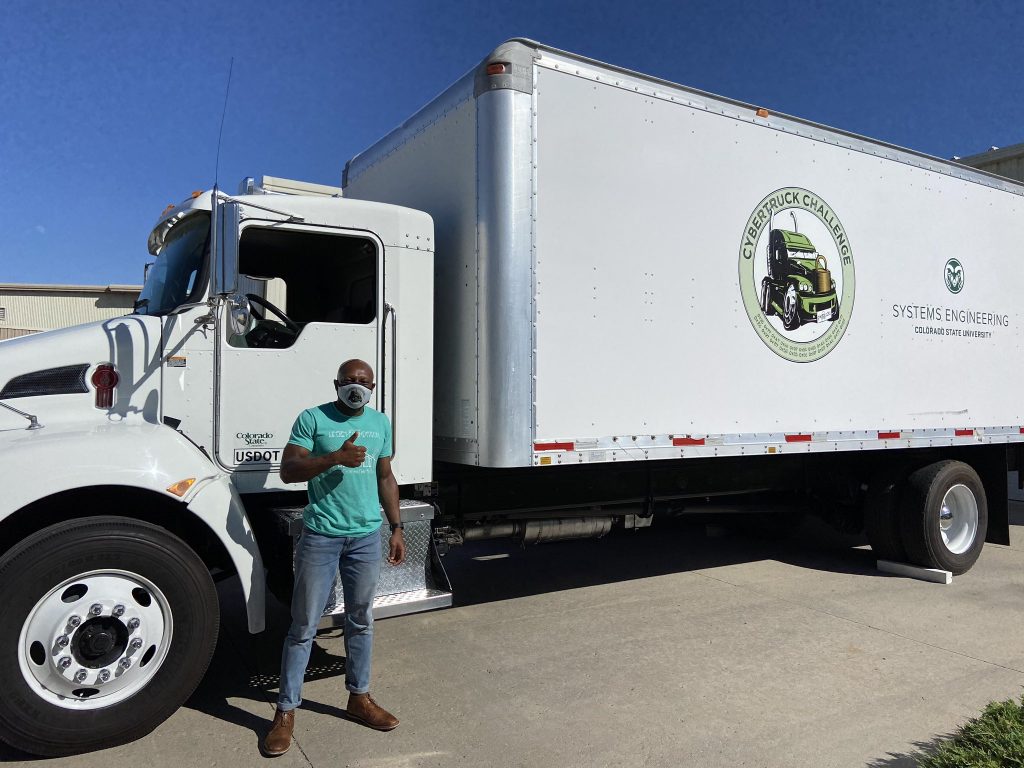
David Nnaji, a second-year master’s student and graduate research assistant in systems engineering, has been awarded the National Motor Freight Traffic Association Heavy Vehicle Cyber Security Scholarship (NMFTA HVCS) for the 2020-2021 and 2021-2022 academic years.
The $5000 per year scholarship is presented to two students pursuing their master’s or bachelor’s degree in computer science or a relevant engineering degree.
NMFTA is a nonprofit membership organization headquartered in Alexandria, Va. Its membership is comprised of motor carriers operating in interstate, intrastate and foreign commerce.
Nnaji was first introduced to the scholarship while an undergraduate at Tulsa University working in Jeremy Daily’s research group.
After graduating from the University of Tulsa in 2019 with his bachelor’s in mechanical engineering, Nnaji moved from his hometown, Tulsa, to Fort Collins to start his master’s program in systems engineering.
Daily joined systems engineering the same semester as an associate professor.
“After graduating, I was offered a funded graduate research position here at CSU by [Daily],” Nnaji said. “Accepting this opportunity is ultimately what led me to study systems engineering since I already knew and worked with [Daily] on vehicle network cybersecurity research at TU.”
Systems-thinking and vehicle cybersecurity
Nnaji’s thesis research is focused on securing network communications between the tractor and trailer of commercial vehicles. He implements systems-thinking in his research through the consideration and weighting of different engineering disciplines into one functioning system.
“When I think of automobiles, I think of the mechanical, electrical, computer, and, now, the cybersecurity elements that go into it,” Nnaji said. “The modern vehicle, for instance, is a dense collection of mechanisms, power systems, ECUs, sensors, and networks working together as a collective whole to provide a safe and enjoyable driving experience.”
In addition to his thesis research, he also supports other research projects that work to secure network communication on other portions of heavy vehicles.
Most recently, Nnaji helped integrate a defense system into the Systems Engineering CyberTruck Challenge research truck.
This past July, he drove the truck to Warren, Mich. and presented results from some of this research alongside Daily, Benjamin Ettlinger, a first-year master’s student in systems engineering, and DG Technologies.
Hobbies and sources of inspiration
Outside of class and his multiple research projects, Nnaji enjoys cooking.
“If you ask my friends and family, they’ll tell you ‘David loves to cook!’ and it’s true,” Nnaji said. “You can catch me preparing Northern Italian cuisine at RARE Italian on the weekends.”
Nnaji finds inspiration in the people he grew up with as well as previous professors.
“I think my parents and many of the adults I grew up around in [Tulsa] inspire me to do the best I can with the talents that I have,” Nnaji said. “Also, I’m always inspired by the professional development stories of my professors and instructors. I tend to pick out how they overcome challenges and how they developed their skill throughout their career.”